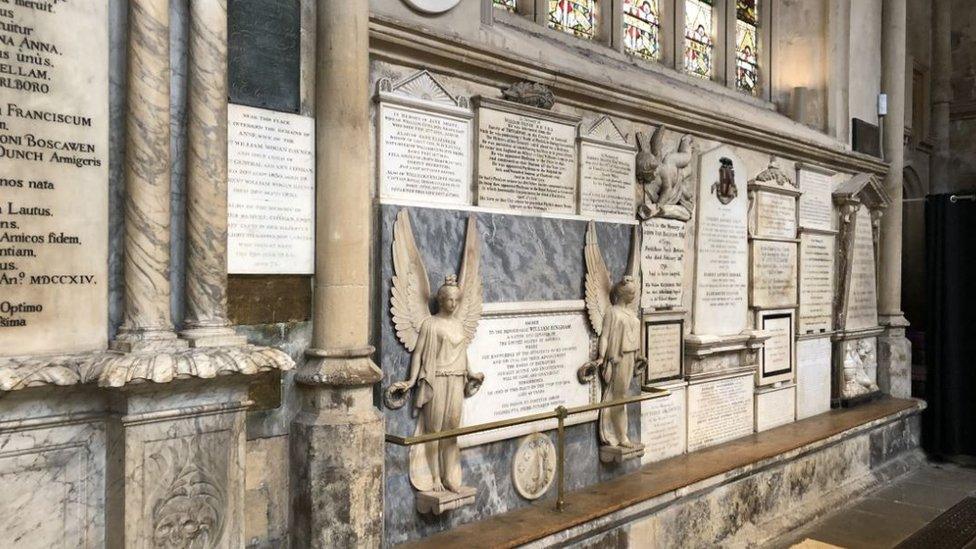Website uncovering Bath Abbey's lost memorials launches
- Published

The website tells the stories of the 1,500 memorials at Bath Abbey
A website uncovering the unknown stories connected to memorials at an historic abbey has been launched.
Mostly funded by the National Lottery Heritage fund, the Bath Abbey memorials website, external features the stories of around 1,500 memorials which can be found on the site's floors and walls.
It is a result of eight years of research by archivists and volunteers.
Learning Manager, Polly Andrews, said it was a chance for everyone to "find out about the Abbey's rich history."
Ms Andrews, who has been part of the Abbey's Monumental Lives project for six years, said the website is the result of "years of hard work".
Learning manager, Polly Andrews said the project had allowed them to find and tell the stories of "invisible lives"
She said while they were aware that they had some famous memorials, including Richard 'Beau' Nash who was the master of the ceremonies in Georgian Bath, the project has enabled staff to find "those invisible lives and really tell their stories for the first time" - particularly the stories of women.
Among the women featured is Martha Caroline Goldworthy, someone who volunteer Ceris Humphries said was unusual for her time.
Ms Humphries said: "Very often the ladies are mentioned only as a sister or a daughter on memorials. She is unusual as she actually had a paid job and that job that happened to be with the Royal family."
One of the stories features includes that of 'ingenious' stone carver John Harvey
Governess to the princess daughters of King George III and Queen Charlotte, Martha was involved with the family for more than 30 years, and lived in the royal palaces, added Ms Humphries.
"She was extremely closed to Queen Charlotte. She was the lady who was chosen to be with Queen Charlotte at the time when the queen was desperately concerned about King George's first mental health collapse," she said.
"She eventually had a bed put in Queen Charlotte's bedroom to be with her during this difficult time," she added.
Another of the forgotten stories is that of Ann Partis, who research volunteer John Taylor said had no children and moved to Bath from London with her husband Fletcher Partis, a very wealthy conveyancer.
Mr Taylor said after their move to Bath, the couple decided to build Partis College, for women who had "fallen on hard times".
The website is the result of eight years of research
"She saw all around her, women, the daughters of clergy, the widows of clergy, who had little money and decided they would build a set of alms-houses for 30 women," he added.
However, Fletcher Partis died six weeks after buying the land and Ann Partis later "went ahead, fought against everybody, had the college built".
She then managed the college, which now exists as retirement homes, until her death in 1846.
Mr Taylor said finding the information was fascinating but also difficult
"We spent a lot of time in the record office."
The work has been done by archivists and volunteers at Bath Abbey
Other stories that have been uncovered are that of the "ingenious" stone carver John Harvey, who lived on Westgate Street.
Volunteer Vanessa Reed, who has worked with the archivists since 2018, said although he was fairly well known in the area, he was a "more lowly character" despite his work on the remodelling of St Michael's Without church.
On uncovering all the stories, Ms Humphries said: "It's nice to be able to bring people out of the darkness and into the daylight."
Follow BBC West on Facebook, external, Twitter, external and Instagram, external. Send your story ideas to: bristol@bbc.co.uk , external
- Published4 August 2023
- Published21 July 2023
- Published17 October 2021